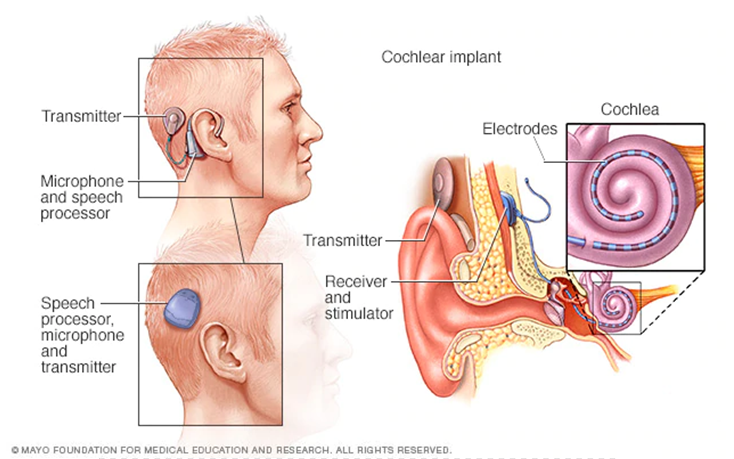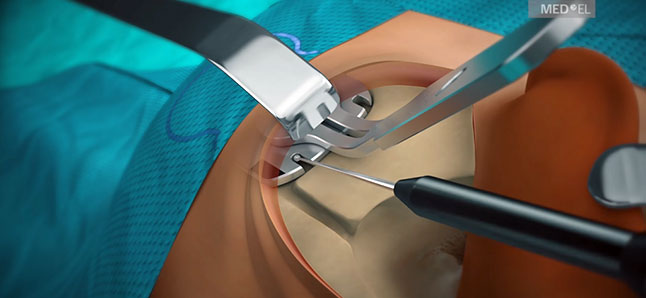A cochlear implant is a small electronic device that electrically stimulates the cochlear nerve (nerve for hearing). The implant has external and internal parts.
Why might you need cochlear implant surgery?
You, your health care provider and an audiologist may consider a cochlear implant if you are experiencing hearing loss and continue to rely heavily on lip reading. Candidates for cochlear implant surgery include individuals who:
- Are experiencing hearing loss and are not helped by hearing aids
- Have hearing in both ears but with poor clarity
- Miss half or more of spoken words, without lip reading, even when wearing hearing aids
- Rely heavily on lip reading, despite wearing hearing aids
- New born who suffers from severe hearing loss and that makes thimun able to speak
In cases of more moderate hearing loss, a partially inserted cochlear implant is used to preserve hearing so that both a hearing aid and the cochlear implant may be used simultaneously in the same ear. In more severe cases of hearing loss, however, a fully inserted cochlear implant is needed to achieve the full benefit of electrical hearing

What are the risks of cochlear implant surgery?
Cochlear implant surgery is a safe and well-tolerated procedure. Rarely, as with all surgeries, risks can occur, including:
- Bleeding
- Swelling
- Infection in the area of the implant
- Ringing in the ears (tinnitus)
- Dizziness or vertigo
- Numbness around the ear
- Changes in taste
- Dry mouth
- Injury to the facial nerve, which can cause movement problems in the face
- Leakage of spinal fluid
- Infection of the membrane that covers the brain (meningitis)
- Risks of general anesthesia
- Need to have the implant removed because of an infection
There may be other risks, depending upon your medical condition. Be sure to discuss any concerns with your health care provider before the procedure.
What happens during cochlear implant surgery?
Cochlear implant surgery is done in a hospital or clinic. The surgery lasts two to four hours. You are given medication (general anesthesia) to make you sleep during the procedure.
- The surgeon makes a cut behind the ear and then opens the mastoid bone.
- The surgeon identifies the facial nerves and creates an opening between them to access the cochlea, which is then opened. He or she inserts the implant electrodes into the cochlea.
- The surgeon places an electronic device called the receiver under the skin behind the ear, securing it to the skull in this area.
- The incisions are then closed, and you will be moved into the recovery area and watched closely.
- You will be discharged after at least two hours of observation.

What happens after cochlear implant surgery?
When leaving the hospital you will be given instructions on how to care for the incisions. You will also learn how to change dressings and care for your stitches. You may wash your ear as normal after a day or two. A follow-up appointment is made for about one week later or at activation to inspect the incisions and remove the stitches.
You should report increased pain, drainage or fever to your health care provider following the procedure. You will have some time to heal after the initial surgery before the implant device is turned on or activated. About twoto four weeks after the surgery, the external parts of the cochlear implant will be added. These include a microphone and speech processor. At that time, the speech processor is programmed and activated, which causes the internal device to stimulate the cochlear nerve in response to sounds.
You will also learn the basics of using and caring for the implant. You may need to return for several visits over a few days for adjustments. Further fine-tuning will take place over several months. Learning to use a cochlear implant is a gradual process. It will likely require visits with speech-language specialist and audiologists. With commitment, you can experience an improved quality of life with a cochlear implant.







